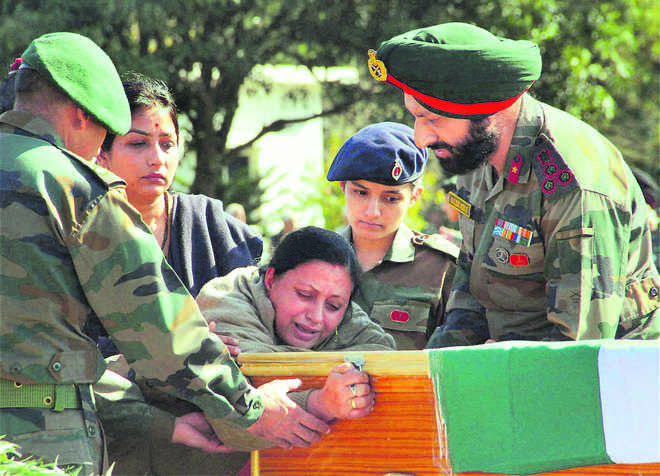Questions must be asked, errors pin-pointed and those conducting counter-terrorist operations held responsible. Neutralising a handful of terrorists, with heavy casualties of the Security Forces is not professional. Why do we not draw lessons from the actions taken recently in France and earlier in US?

The mother of Captain Tushar Mahajan, killed in a gun battle with militants at Pampore, breaks down near her son’s coffin. PTI
Repeatedly, one witnesses counter-terrorist operations resulting in undue casualties to our troops, be it Pathankot and now at Pampore, Srinagar. The earlier instances of Samba and elsewhere notwithstanding. What is most striking is that the casualties suffered by our security forces in such operations are always a multiple of that suffered by the terrorists. Let us compare this to the operations of Americans and other armies in Afghanistan. They too were faced with such a situation to begin with, but very quickly they reoriented their method of engagement with better intelligence, inducted better technology such as the extensive use of drones and pin-point targeting weapons, and above all providing high-end fatigue and personal gear to the soldiers. Through such efforts they have reduced their casualties to a very low percentage. On the other hand, even after more than 25 years of operations in Jammu and Kashmir, and an even larger background experience in India, we have still not refined our response mechanism, equipment or intelligence-gathering methods to an adequate degree. Ironically, we have the advantage of conducting an operation within our territory, thus have the opportunity of freedom and speed of movement and flexibility in such operations. We are also familiar with the terrain and language, help of the local administration is easily available and the Government and the command-and-control structure is our own. Add to this, decades of hands-on experience. A negative factor that is affecting our anti-terrorist operations is the easy and unaccounted availability of funds. Our intelligence-gathering has degenerated to purchasing intelligence through informers, thus the delay and inaccuracies. An additional factor is the lack of appropriate and adequate equipment with the troops engaged in actual anti-terrorist operations. The close combat weapons used by our troops in such operations are more akin to military operations as against anti-terrorist operations. An example is how our troops still use a very old version of rocket launchers to engage militants in a building or a hideout. It not only hampers the quick movement of troops, but gives away their position easily and can at best only punch a hole in the structure. It cannot incapacitate or blind the occupants, to facilitate further operations. The methods of engagement are as they were years back. Better equipment and engagement methods thus require upgradation. In the absence of such upgradation, casualties will continue to be high and frequent surprises due to the lack of accurate and updated intelligence will result in improper as well as inadequate response. These inadequacies are covered by shouting nationalistic slogans and the glorification of frequent cremations. First and foremost, the tendency to resort to a graduated response in a given terrorist operation is the first pitfall. We saw it recently at Pathankot. It was first left to the Garuds of the IAF to neutralise the militants who had achieved total surprise in the first place. Once they were overwhelmed and casualties resulted, cordoning off by the police was considered adequate with a special forces team flown in. In such a manner, ultimately a much larger force got engaged, there were higher casualties and the command and control went out of hand. There was a similar situation at Pampore recently. In the given operation at Pampore, a pertinent question is: How can a trained military mind think of a few special forces’ persons storming a five-storey building (like the one in question at Pampore) , without first pinning down or incapacitating the terrorists. As a result, there were high casualties and the subsequent very familiar glorification of cremation. It is only thereafter that higher commanders in charge of the operation come on camera to say that time will not be a constraint, but a very deliberate operation will be undertaken to minimise casualties. There are already high casualties and a number of days have been exhausted with no definite information about the terrorists. Are young lives in India so cheap?It is time questions were asked, errors pin-pointed and those conducting these operations held responsible. Neutralising a handful of terrorists, with heavy casualties of the security forces is no professional work. Above all, why do we not draw lessons from the actions taken very recently in France and earlier in the US, by constantly tracking a militant outfit and pre-empting its actions, so that they cannot resort to the luxury of undetected movement and surprise the security forces by mounting an attack as audacious as the one at Pathankot. It is time to set our house in order. Public sentiment must be targeted towards high casualties and not limited to a glorified funeral of these brave young men, which begins and ends as quickly with nationalistic slogans. Accountability, both political and at the level of operation, will hopefully be the outcome.
